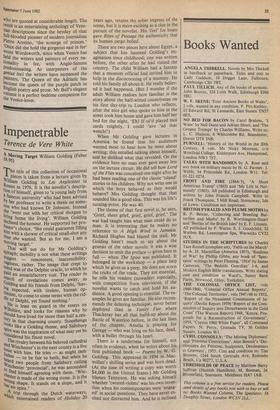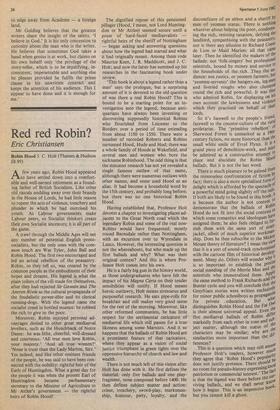Impenetrable
Terence de Vere White
A Moving Target William Golding (Faber £8.95)
The title of this collection of occasional Pieces is taken from a lecture given by Zilliarn Golding to Les Anglicistes in Rouen in 1976. It is the novelist's descrip- tion of himself, given to 'a young lady from , " ` fatuous university' who had been advised by her professor to write a thesis on some- one who had known Dr Johnson. Instead she 'went out with her critical shotgun to bring home the living'. William Golding declined the honour. He supported her pro- fessor's choice. 'She could guarantee filling nn with a shower of critical small-shot any Mae she wanted. But as for me, I am a 1110Ving target.' That will not do for Mr Golding's epitaph; mobility is not what these writings suggest — remoteness, inaccessibility, caginess, rather. The image that crept to hainci was of the Delphic oracle, to which he rd an unsatisfactory visit. The reader in jh of revelations comes away, as ding and his friends from Delphi, 'n8 expect expected, with tireless, human op- Pistn, to come to some terms with the rid- ,Of Delphi, yet found nothing.'
is on the on
Wil. tshireleast, and looksguard forin reasonsessays why he tshould have lived for more than half a cen- illrY in that °0It charming county. Stonehenge s like a Golding theme, and Salisbury s pire Was the inspiration of what may yet be Considered his finest novel. a The rivalry between his beloved cathedral Winchester's in the next county is a live stle with him. He triesmight their Ther — to be fair to both, but when he bead two people from Salisbury calling to 'provincial', he was astonished find himself agreeing with them. `Win- chester is made of the wrong stone. It is the mono shape. It stands on a slope, and it "'as no spire.' trip through the Dutch waterways, ich entertained readers of Holiday 20 years ago, retains the sober impress of the scene, but it is more exciting as a clue in the pursuit of the novelist. His 'feel' for boats gave Rites of Passage the authenticity that its human cargo belied.
There are two pieces here about Egypt, a subject that has haunted Golding's im- agination since childhood; one was written before, the other after he had visited the country. The child William had a fantasy that a museum official had invited him to help in the discocooning of a mummy. He told his family all about it. He really believ- ed it had happened. (But I wonder if the adult William realises how familiar is the story about the half-witted countryman on his first day-trip to London who reflects, after the nice girl who spoke to him in the street took him home and gave him half her bed for the night, 'Eh! If oi'd played moi cards roightly, I could 'ave 'ad that wench!')
When Mr Golding gave lectures in America he found that his audiences wanted most to hear how he went about writing; this entailed talking about himself, and he disliked what that revealed. On the evidence here no man ever gave away less on the lecture circuit. He did tell how Lord of the Flies was conceived one night after he had been reading one of the classic 'island' stories to his children. Why not write one in which the boys behaved as they would behave? Mrs Golding thought that that sounded like a good idea. This was his life's turning-point. He was 40.
The theme of that first novel is, he says, `Grief, sheer grief, grief, grief, grief.' The war had taught him what man could do to man. It is interesting that he makes no reference to A High Wind in Jamaica. Richard Hughes had blazed the trail. Mr Golding hasn't much to say about the genesis of the other novels: it was a wise decision to omit the preface — given here in full — when The Spire was published. It belonged in the workshop — a place into which he gives us a peep. He does not scorn the tricks of the trade. They are essential, he tells his readers (nowadays especially, with competition from television), if the novelist wants to catch and hold his au- dience. A good opening is essential. The ex- amples he gives are familiar. He also recom- mends the delaying technique, never better deployed than in Vanity Fair where Thackeray has all that build-up about the Battle of Waterloo before, in the last lines of the chapter, Amelia is praying for George — who was lying on his face, dead, with a bullet through his heart.
There is a tenderness for himself, not often in evidence, when he writes about his first published book — Poems by W. G. Golding. This appeared in 1934 in Mac- millan's shilling series and was born dead. (At the time of writing a copy was worth $4,000 in the United States.) Mr Golding blames Tennyson. He was asking himself whether 'twisted violets' was his own inven- tion when his contemporaries were 'engag- ed' in social questions. They have never ex- cited nor distracted him. And he is inclined
to edge away from Academe — a foreign land.
Mr Golding believes that the greatest writers share the insight of the saints. 'I believe in God.' It is his only concession to curiosity about the man who is the writer. He believes that sometimes God takes a hand when genius is at work, but claims on his own behalf only 'the privilege of the story-teller, which is to be mystifying, in- consistent, impenetrable and anything else he pleases provided he fulfils the prime clause in his unwritten contract and keeps the attention of his audience. This I appear to have done and it is enough for me.'







































 Previous page
Previous page